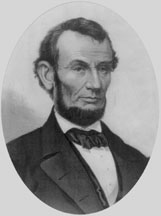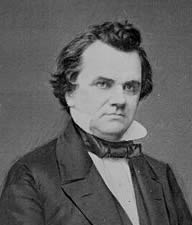This Week in History
October 13-19, 1858
The Lincoln-Douglas Debates: Lincoln Exposes Douglas
As an Enemy of the Declaration of Indepedence
October 2013
 Abraham Lincoln |
 Stephen Arnold Douglas |
On Oct. 15, 1858 Abraham Lincoln and Stephen A. Douglas faced off for the last of their debates in Alton, Ill. After the seven Lincoln-Douglas debates for the U.S. Senate seat from Illinois had been arranged in mid-summer, Abraham Lincoln sat down and drafted a speech that he never gave. It was a working paper of his closely-reasoned arguments to expose the sophistry of his opponent. Stephen Douglas posed as completely neutral on the subject of whether or not slavery was to be extended into new areas of America, saying that what he supported was "popular sovereignty," the supposed right of any territory's citizens to vote slavery in or out. Yet Douglas supported every legislative and judicial decision that made it impossible for the anti-slavery forces to stop the spread of slavery.
At the end of his paper, Lincoln focused on Douglas's tenacious support for the Supreme Court's Dred Scott decision, and posed the question of why this was so, when Douglas had denounced so many Supreme Court decisions before it. Lincoln asked, "Why does he adhere to it so pertinaciously? Why does he thus belie his whole past life? Why, with a long record more marked for hostility to judicial decisions than almost any living man, does he cling to this with a devotion that nothing can baffle? In this age, and this country, public sentiment is every thing. With it, nothing can fail; against it, nothing can succeed. Whoever moulds public sentiment, goes deeper than he who enacts statutes, or pronounces judicial decisions. He makes possible the inforcement of these, else impossible.
"Judge Douglas is a man of large influence. His bare opinion goes far to fix the opinion of others. Besides this, thousands hang their hopes upon forcing their opinions to agree with his. It is a party necessity with them to say they agree with him; and there is danger they will repeat the saying till they really come to believe it. Others dread, and shrink from his denunciations, his sarcasms, and his ingenious misrepresentations. The susceptible young hear lessons from him, such as their fathers never heared when they were young.
"If, by all these means, he shall succeed in moulding public sentiment to a perfect accordance with his own—in bringing all men to indorse all court decisions, without caring to know whether they are right or wrong—in bringing all tongues to as perfect a silence as his own, as to there being any wrong in slavery—in bringing all to declare, with him, that they care not whether slavery be voted down or voted up—that if any people want slaves they have a right to have them—that Negroes are not men—have no part in the declaration of Independence—that there is no moral question about slavery—that liberty and slavery are perfectly consistent—indeed, necessary accompaniments—that for a strong man to declare himself the superior of a weak one, and thereupon enslave the weak one, is the very essence of liberty—the most sacred right of self-government—when, I say, public sentiment shall be brought to all this, in the name of heaven, what barrier will be left against slavery being made lawful every where? Can you find one word of his, opposed to it? Can you not find many strongly favoring it? If for his life—for his eternal salvation—he was solely striving for that end, could he find any means so well adapted to reach the end?
"If our Presidential election [of James Buchanan], by a mere plurality, and of doubtful significance, brought one Supreme Court decision, that no power can exclude slavery from a Teritory; how much more shall a public sentiment, in exact accordance with the sentiments of Judge Douglas bring another that no power can exclude it from a State?
"And then, the Negro being doomed, and damned, and forgotten, to everlasting bondage, is the white man quite certain that the tyrant demon will not turn upon him too?"
In the last debate at Alton, Douglas left no doubt that he was a sworn enemy of the founding purpose of the United States—to be a temple of liberty and a beacon of hope for the rest of mankind—yet, there were still many who applauded his words:
'But the Abolition party really think that under the Declaration of Independence the Negro is equal to the white man, and that Negro equality is an inalienable right conferred by the Almighty, and hence, that all human laws in violation of it are null and void. With such men it is no use for me to argue. I hold that the signers of the Declaration of Independence had no reference to negroes at all when they declared all men to be created equal. They did not mean Negro, nor the savage Indians, nor the Fejee Islanders, nor any other barbarous race.'
"'They were speaking of white men. They alluded to men of European birth and European descent—to white men, and to none others, when they declared that doctrine. I hold that this government was established on the white basis. It was established by white men for the benefit of white men and their posterity forever, and should be administered by white men, and none others.'"
In his rebuttal, Lincoln countered by stating that those who recently were asserting that the Declaration of Independence did not include the Negro were actually launching a "sneaking" attack upon the Declaration itself. As for the Founding Fathers' view of slavery, Lincoln asked why "they made provision that the source of slavery—the African slave trade—should be cut off at the end of twenty years? Why did they make provision that in all the new territory we owned at that time slavery should be forever inhibited? Why stop its spread in one direction and cut off its source in another, if they did not look to its being placed in the course of ultimate extinction?" Further, Lincoln stated that the institution of slavery is only mentioned in the United States Constitution two or three times, and in none of these cases does the word "Slavery" or "Negro race" occur, but general language is used instead. That was because, said Lincoln, the Founding Fathers wrote the Constitution for the ages, and they had no intention of enshrining in it an institution which they intended should pass from the Earth.
Lincoln then went after Douglas's lying characterization of "popular sovereignty" as being the solution to the slavery question. Referring back to earlier debates, Lincoln cited Douglas's statements that he didn't care whether slavery was voted up or down in the Territories.
"I do not care myself in dealing with that expression, whether it is intended to be expressive of his individual sentiments on the subject, or only of the national policy he desires to have established. It is alike valuable for my purpose. Any man can say that who does not see anything wrong in slavery, but no man can logically say it who does see a wrong in it; because no man can logically say he don't care whether a wrong is voted up or voted down. He may say he don't care whether an indifferent thing is voted up or down, but he must logically have a choice between a right thing and a wrong thing.... He says that upon the score of equality, slaves should be allowed to go in a new Territory, like other property. This is strictly logical if there is no difference between it and other property. If it and other property are equal, his argument is entirely logical. But if you insist that one is wrong and the other right, there is no use to institute a comparison between right and wrong. You may turn over everything in the Democratic policy from beginning to end, whether in the shape it takes on the statute book, in the shape it takes in the Dred Scott decision, in the shape it takes in conversation or the shape it takes in short maxim-like arguments—it everywhere carefully excludes the idea that there is anything wrong in it.
"That is the real issue. That is the issue that will continue in this country when these poor tongues of Judge Douglas and myself shall be silent. It is the eternal struggle between these two principles—right and wrong—throughout the world. They are the two principles that have stood face to face from the beginning of time; and will ever continue to struggle. The one is the common right of humanity and the other the divine right of kings. It is the same principle in whatever shape it develops itself. It is the same spirit that says, 'You work and toil and earn bread, and I'll eat it.' No matter in what shape it comes, whether from the mouth of a king who seeks to bestride the people of his own nation and live by the fruit of their labor, or from one race of men as an apology for enslaving another race, it is the same tyrannical principle.
"I was glad to express my gratitude at Quincy, and I re-express it here to Judge Douglas—that he looks to no end of the institution of slavery. That will help the people to see where the struggle really is. It will hereafter place with us all men who really do wish the wrong may have an end. And whenever we can get rid of the fog which obscures the real question—when we can get Judge Douglas and his friends to avow a policy looking to its perpetuation—we can get out from among them that class of men and bring them to the side of those who treat it as a wrong. Then there will soon be an end of it, and that end will be its 'ultimate extinction.'"*
* Spelling and punctuation as in Lincoln's original document.
The original article was published in the EIR Online’s Electronic Intelligence Weekly, as part of an ongoing series on history, with a special emphasis on American history. We are reprinting and updating these articles now to assist our readers in understanding of the American System of Economy.
